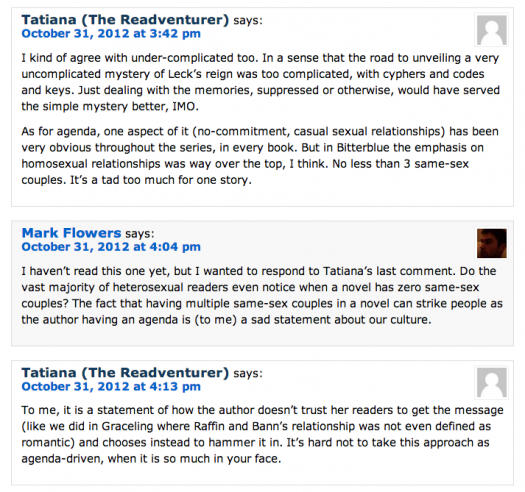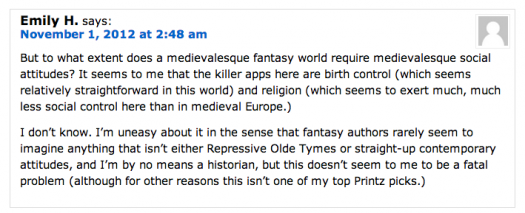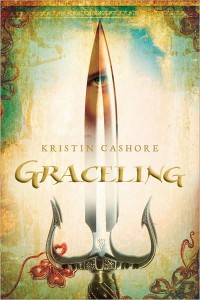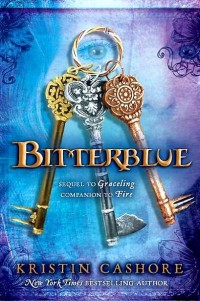Heteronormativity, fantasy, and Bitterblue - Part 1
Earlier this week I read a post discussing Kristin Cashore's Bitterblue on School Library Journal's blog Someday My Printz Will Come, which is devoted to analyzing YA books that librarians think may or may not be contenders for the Printz Award. This post went up on Oct. 29, so I'm a bit behind, but I couldn't stop thinking about it, so I decided to blog about it. In the post, the blogger, Sarah Couri, wrote that she enjoyed Bitterblue as a fan, but thought it was too flawed to be a serious Printz contender. All well and good. The interesting part of the post, to me, was the discussion in the comments that followed. (Go here to read the post and comments in full.)
SPOILER WARNING: Spoilers for all three of Kristin Cashore's novels, Graceling, Fire, and Bitterblue, although I don't think they're major spoilers.
Also, before I go any further, some disclaimers: I am a YA author who writes fantasy, and I am a big fan of Kristin Cashore's novels, though I don't know her personally. I've only met her once, and I was totally nervous like a fangirl! I do read her blog posts, but that's the extent of my knowledge of her. Despite my fannishness, I don't believe her books (or any books) are flawless. I'm trying to approach this post with openness and generosity, and though it sounds cheesy, I hope you will too.
OK, so let's continue: The first comment after the post was from Tatiana (The Readventurer) who disliked Bitterblue and felt that it was "too obvious in the delivery of its liberal agenda." Then came these comments in response that really made me sit up:

Followed by this further explanation:

And this counterpoint:

I want to also point out Tatiana's clarification of her own position:

I want to note that I don't believe Tatiana's comments were homophobic. In fact I agree with some of her criticism of Bitterblue, but you'll have to wait till tomorrow when I post part 2 to get into that, because this post is just way too long!
Anyway, two topics emerged from this discussion that I found very fascinating:
- What constitutes "subtlety" when it comes to describing same-sex relationships in fiction?
- Is it believable to have same-sex relationships in a medieval-esque fantasy world?
I'm going to begin with number one: the issue of subtlety. I thought that Tatiana's comment here was very telling: "it is a statement of how the author doesn’t trust her readers to get the message (like we did in Graceling where Raffin and Bann’s relationship was not even defined as romantic) and chooses instead to hammer it in."
 First, kudos to Tatiana for understanding the nature of Raffin and Bann's relationship in Graceling. I don't think that all readers get that Raffin and Bann are in a romantic relationship because Cashore does not overtly state it. She only hints. The fact that Tatiana gets it indicates that she's a careful reader and is also open to the idea of gay relationships. She sees them, which is more than some readers do.
First, kudos to Tatiana for understanding the nature of Raffin and Bann's relationship in Graceling. I don't think that all readers get that Raffin and Bann are in a romantic relationship because Cashore does not overtly state it. She only hints. The fact that Tatiana gets it indicates that she's a careful reader and is also open to the idea of gay relationships. She sees them, which is more than some readers do.
For me, I found the hinting about Raffin and Bann's relationship in Graceling to be disappointing because there's a fine line between "subtle" and "the love that dare not speak its name." For much too long, speaking openly about homosexuality was verboten because it was considered morally wrong. For me, hinting about someone's sexual orientation simply smacks of negative judgement.
I'm not saying I believe that Kristin Cashore was negatively judging her characters. What I'm saying is that by only hinting about Raffin and Bann's relationship, Cashore has fallen into the trap of the closet. She has cloaked their love in a negative context, even if that's not what she intended. ((And I don't believe that's what she intended, because in one scene Katsa obliquely acknowledges Raffin and Bann's relationship and has no negative feelings about it. However, that is my interpretation of her intentions, which only she knows for sure.))
 The solution to avoiding the closet trap? Coming out. That's what Cashore does with same-sex relationships in Bitterblue, and I really appreciated that as a lesbian reader. Because Bitterblue openly and straightforwardly acknowledges the existence of same-sex relationships — and because it's clear that Bitterblue doesn't think there's anything wrong with them — the reader is positioned to read those relationships positively.
The solution to avoiding the closet trap? Coming out. That's what Cashore does with same-sex relationships in Bitterblue, and I really appreciated that as a lesbian reader. Because Bitterblue openly and straightforwardly acknowledges the existence of same-sex relationships — and because it's clear that Bitterblue doesn't think there's anything wrong with them — the reader is positioned to read those relationships positively.
In this case, I think that subtlety is the wrong choice. I think that direct clarity is sometimes preferable, especially when writing about potentially controversial subjects such as sexual orientation and race. Subtlety in these cases too often leads to misunderstandings on the part of readers because contemporary mainstream American culture heavily favors a straight, white narrative. If you're not writing a straight, white narrative, you as the writer (I believe) have a responsibility to come out about it. In other words: just say it.
When you just say it, you do run the risk of some readers believing that you're not being subtle enough. However, "not subtle enough" in this case is, I believe, an example of heteronormativity in action.
Heteronormativity is a worldview that is shared by the vast majority of people on this planet, in which heterosexuality is viewed as normal and homosexuality is marginalized as abnormal. This is not the same as homophobia, which is a straightforward fear or hatred of homosexuals. I don't believe that having a heteronormative worldview makes you evil, but I do think it can blind a person to the possible existence of lesbian, gay, bisexual, and transgender people in many situations.
The problem for the writer who is writing a narrative that includes LGBT people is that most readers exist in a heteronormative world. They expect most characters to be straight. In certain contexts — especially historical contexts or fantasy novels set in apparently premodern time periods — it can feel anachronistic to have LGBT characters living openly gay lives.
This doesn't mean that people in the Middle Ages never engaged in same-sex relationships. People who loved other people of the same sex have existed throughout all of history and in every culture. However, being "gay" as an identity is a modern concept that did not truly exist until the early twentieth century.
So, is it unrealistic to have gay characters in a medieval-esque setting? No … and yes. There probably weren't any "gay" people in the Middle Ages, at least insofar as we contemporary Americans understand the term "gay." There were no Pride parades, Dyke Marches or stereotypes about gay men being extremely stylish dressers. But there were people who had same-sex relationships, sure.
However, I don't think the average reader of novels is going to sit around thinking about this — and they shouldn't. Part of the writer's job (especially in fantasy) is to create a fictional world that is convincing, and no matter what the real-world facts are, you can't get around someone's feelings. Of course, there's no way to predict what every reader will feel about the world you create, but you have to take a stab at it in order to make sure they understand the story you're telling.
That's why I don't think that Tatiana's reaction (which is not unusual at all) is entirely due to heteronormativity. I also think it's related to Cashore's world-building. And that brings me to point number two: Is it believable to have same-sex relationships in a medieval-esque fantasy world?
Because this post has gotten so long, I'm going to stop here and continue with point number 2 tomorrow. Stay tuned! (And here's part 2.)